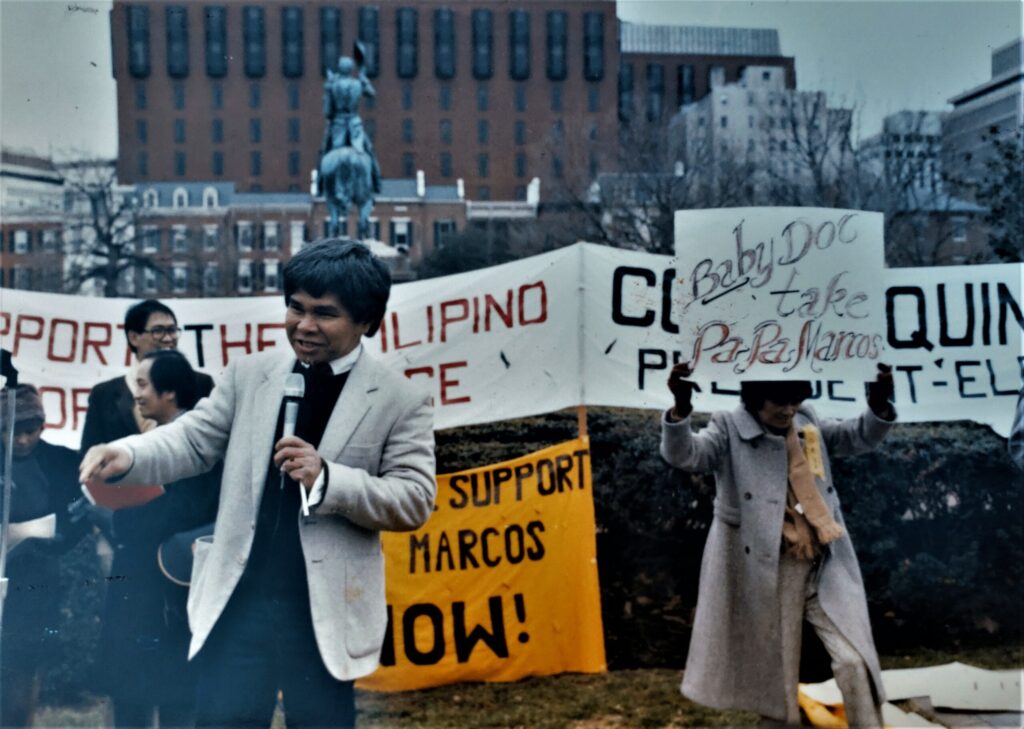EDITOR'S NOTE
This story was first published via the Asian American Journalists Association’s Voices program.
As racial tensions were on the rise following the death of George Floyd, Manila Mail gave Filipino Americans, from children to lawmakers, a voice to respond to the moment.
In the summer 2020 issue, a Filipino resident of Leesburg, Virginia—a suburb of Washington, D.C. —and a father of two daughters who participated in a silent march in solidarity with the Black Lives Matter movement said: “We are proud of our daughters for wanting to engage with the harsh and uncomfortable realities of our country … It was very emotional for us to be there together.”
For 30 years, Manila Mail provided about 65,000 Filipino immigrants and their descendants in the greater D.C. metropolitan area a platform for discourse and connection.
Often found in restaurants and businesses, the paper covered a full spectrum of topics from the experiences of Filipino nurses in the COVID-19 pandemic to the policy changes between Philippine presidencies. However, the paper was also hyperlocal—focusing on community events such as golden weddings, graduations, and birthday celebrations.
But printing stopped in late 2021, during the throes of the pandemic.
While community members praised the work of the paper, political fractures, and financial strain ultimately played a role in Manila Mail’s closure.
“As you can imagine, it’s really overwhelming,” Jon Melegrito, former editor in chief of the paper, said of political developments affecting the Filipino diaspora like the rise of Ferdinand “Bongbong” Marcos Jr., the son of the late dictator. “I wish we still had the money to cover these issues, to enlighten our community, to give insights about how they can engage.”
Telling the community’s story
Melegrito, 79, began his career in journalism covering the U.S. Congress as it discussed human rights abuses committed during the dictatorship of Ferdinand Marcos Sr. in the 1980s. It was a job that would shape his perspective for the decades to come.
He was determined to unearth stories that brought dignity to individuals who had been disempowered through political or cultural forces.


The last in his family to immigrate to the United States, Melegrito arrived in Fayetteville, Missouri, in 1965 to study English at Central Methodist College.
Interwoven in this fascination with language was Melegrito’s interest in the stories of his family. His father was one of the survivors of the Bataan Death March, which killed thousands of Filipino and American prisoners of war in 1942.
The intergenerational stories that Melegrito documented for his personal records would play an integral role in his own columns.
The front page story for a 2021 Manila Mail issue commemorated Filipino fathers who built families after serving in World War II. “Where Have All the Soldiers Gone?” celebrated everyday memories while acknowledging the sweeping historical forces—be it warfare or migration—that have shaped the Filipino community in Washington.
The story interviewed 10 residents who reflected on their experience growing up with veteran fathers.
A Chevy Chase, Maryland resident Ronie Nieva keeps pencil sketches from her late father who documented the malaria and mountains of his guerrillero days.
“The war was never far from our childhood minds,” she wrote.
Manila Mail was unique because it centered the perspectives of Filipinos in the area, according to Krystle Canare, who grew up in Waldorf, Maryland.
The 31-year-old remembered her mother would bring home Manila Mail after shopping at the Filipino grocery store Salinas in Fort Washington, Maryland. Canare’s mother would save clippings that mentioned the family, like when Canare participated in the Miss Teenage Philippines pageant in the early 2000s.
“They highlighted all things happening in the community, from children’s birthday parties, to immigration stories and how people got married,” Canare said.
The primary reason for the closure of Manila Mail in 2021 was a lack of funds, according to leaders who managed the publishing company behind the paper. It was a decision made by the business’ board of directors, which included the children of the paper’s founder Alberto Alfaro and early contributors.
Manila Mail relied entirely on advertisements from Filipino law firms, remittance agencies, and cargo companies to print issues. Its staff included over two dozen volunteers and a few paid workers.
The cost to print a single issue ranged from $3,500 to $5,000, said Januario Azarcon, the publisher and president of Manila Mail at the time of its closing.
“It was limping along for a long time and I could see the end,” Azarcon said. “It’s amazing that we were able to print for a long time with a shoestring budget.”
Reporting in the age of Trump and Duterte
Manila Mail did, however, receive criticism for its political coverage in its last years of publication. The paper didn’t shy away from issues like the resurgence of the Black Lives Matter movement, or the extrajudicial killings during Philippine President Rodrigo Duterte’s War on Drugs campaign.
Older, longtime readers were concerned that the paper was “tilting” towards a specific political angle, Azarcon said.
The paper closed during the polarizing presidential terms of Donald Trump in the United States and Duterte in the Philippines. Melegrito called the political environment “delicate” because no matter how a story was reported, it had the potential to offend.
“It became problematic, because how do you report the truth?” said Melegrito, who took up the role of editor in chief in 2018.
Melegrito emphasized that the challenge was not simply how to report the truth, but convincing readership about what the truth is and battling against the false narratives that are not substantiated by credible sources or fact.
The proliferation of social media has amplified opportunities for misinformation, Melegrito said. When people decide to believe in these narratives without examining their veracity, he said, the integrity of journalism becomes compromised.
“This competing media, then, not only confuses people, but it fosters a narrative, especially when that narrative is so strong and so relentless,” he said. “If that’s the only source of information, and you no longer even bother to question whether they’re true, you just accept them for what they are.”


Melegrito has long identified himself as an activist journalist, reporting with a clear stance on supporting civil rights and reparations for Filipino veterans.
Knowing the Philippines’ history as a colonial subject of the United States, Melegrito believes that one cannot effectively cover a topic without immersing oneself wholly in it.
“When you mention a historical event that is not pleasant to hear because it’s painful, then you’re not supposed to report it, you’re supposed to be silent, right?” Melegrito said. “To me, a journalist cannot just pretend to be objective by just reporting facts without really getting into why that is.”
The future of Filipino American media
The rise of political polarization around the time of Manila Mail’s closure challenged Melegrito to reflect on what it means to be a journalist today. For Melegrito, that means not just examining the most effective ways of telling the truth in a world saturated with social media algorithms—it also means digging deep into how people can agree on a shared definition of the truth.
“We really have to push back against these relentless social media narratives,” he said. “We cannot just allow them to run amok and dominate the conversation.”
Manila Mail is not the only Filipino publication that has struggled with fighting disinformation in recent years. Just a month before the Philippine presidential election last year, Meta removed 400 Facebook pages because of potential misinformation, according to Bloomberg reporting.
The disinformation induced by political polarization impacts the Filipino diaspora in various ways, said James Zarsadiaz, an associate professor of history at the University of San Francisco whose work focuses on Asian American history and conservatism.
“We complain here in the U.S. about a very complicated, porous, and problematic social media ecosystem,” Zarsadiaz said. “But it’s arguably worse in the Philippines where there’s less controls.”
Zarsadiaz underscored that such misinformation affects Filipinos and Filipino Americans alike.
“Unfortunately, that trickles into the community and its politics,” he said. “It becomes less about the issues now and more personal attacks about the people.”
In spite of the disadvantages that face local publications like Manila Mail, some ethnic media outlets continue to thrive, said Sandy Close, the executive director of Ethnic Media Services, an advocacy organization that focuses on growing the sector and enhancing inter-ethnic communications.
Close said this trend paints ethnic media—including Asian American community publications—in a skewed light. Many ethnic media outlets, she added, continue to survive despite the increased dominance of digital news and declines in print ad revenue.


“My biggest fear is that there’s an element of fatalism for a sector that’s never been taken as seriously as it needs to have been taken,” Close said. “And this is absolutely dangerous.”
In 2022, journalist Casey Ticsay created Mahalaya, a Filipinx newspaper based in San Francisco. The publication, made possible by the work of community volunteers, practices solidarity journalism, which is a commitment to social justice through centering the perspectives of marginalized communities, according to journalism professor and ethicist Anita Varma.
“That doesn’t mean we’re not following certain expectations of journalism,” said Ticsay. “We’re just really putting the community first in our reporting, which means emphasizing their perspectives and expertise.”
Ticsay’s publication has expanded to include coverage of Filipino communities outside of the Bay Area. One issue last year included an article on an Asian American unity march in Washington, D.C.
As Ticsay sees it, Mahalaya builds off of the journalistic work of prior generations of the Filipino diaspora.
“They were also students, workers, migrants, and were very much informed of the ways that journalism around them—and still now—is not written for them, or by them,” Ticsay said. “There needs to be a space where we are empowered to tell our stories.”
Mahalaya is still deciding on a financial structure that can make it sustainable for the long term. The publication does not feature advertisements or endorsements. One thing Ticsay knows for certain: She intends not to adopt conventional funding practices.
“If journalism is being practiced more as a business model, which we see mostly in mainstream media, we don’t want that,” said Ticsay. “We don’t see that that’s really putting the community first.”


Still, the closure of Manila Mail meant that the D.C. Filipino community has been left with gaps in the news they access.
The publication closed before community reporters could cover the divisive 2022 Philippine presidential elections, in which Marcos Jr. was elected. Experts told news outlets that it was an unfair election due to accounts of voter disenfranchisement and online disinformation.
In May, Marcos Jr. visited Washington on a diplomacy trip. He was met by local protestors outside of the Ritz Carlton Hotel as he dined with community members and embassy officials. International outlets only briefly mentioned the protest.
“You feel that void,” said Canare, who was a longtime reader of Manila Mail. “Because it’s like, where do we hold these dialogues?”
Bing Branigin, a close friend of Melegrito and a former columnist for Manila Mail, called the shuttering of the publication “a very bitter pill to swallow.”
“There are so many stories not being told because we were the only Filipino paper in the DMV, and this is the most powerful place to be,” Branigin said.
But Manila Mail’s closure does not mark the end of Melegrito’s dedication to uplifting the voices of his community. He continues to report as a freelancer for various Filipino publications and is involved in a number of advocacy organizations around Washington.
“Our stories highlight who we are,” he said. “And I continue to be invested in that mission.”









